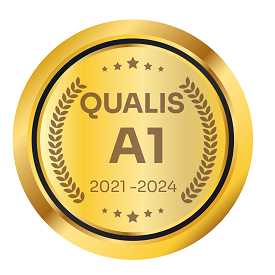Tecnologías de formación de competencia profesional para futuros docentes
DOI:
https://doi.org/10.22633/rpge.v25iesp.7.16172Palabras clave:
Tecnologías de formación, Competencia profesional, Futuros profesores, Educación superiorResumen
El bloque organizacional y atávico de competencias investigativas se caracteriza por el criterio de adquirir habilidades para organizar las actividades investigativas por parte de un docente. Así, este estudio intenta analizar las tecnologías de formación de competencia profesional para futuros profesores. Para lograr el objetivo del estudio se utiliza un método descriptivo. Se toman en cuenta los estudios del proceso de gestión de las competencias psicológicas y pedagógicas de un docente de educación superior para llegar a una conclusión confiable. Con base en los resultados obtenidos, se puede concluir que existe la necesidad de una adecuada organización de las actividades y el uso activo de la tecnología para el trabajo con estudiantes y jóvenes, lo que permite combinar en la mayor medida posible las metas docentes y educativas tanto en el proceso educativo como más allá.
Descargas
Citas
ABYKANOVA, B. et al. Professional competencies and methods for their formation in the university. Ad Alta Journal of Interdisciplinary Research, v. 10, n. 1, p. 59-62, 2020a.
ABYKANOVA, B. et al. The use of modern information technologies in the educational process. Ad Alta Journal of Interdisciplinary Research, v. 10, n. 1, p. 37-40, 2020b.
AGRANOVICH, B. L.; POKHOLKOV, Y. P.; YAMPOLSKIY, V. Z. Integrirovannaya nauchno-obrazovatelnaya informatsionnaya sreda natsionalnogo issledovatelskogo Tomskogo politekhnicheskogo universiteta [Integrated Scientific and Educational Information Environment of the National Research Tomsk Polytechnic University]. In: Proceedings of Scientific-methodical conference “Modern Information Technologies in Education: Southern Federal District”. Rostov-on-Don, 2011. Available: http://conf.sfedu.ru/inftech2011/pres/sbornikSITO2011.pdf. Access: 10 Jan. 2021.
ALEKSANDROV, D. A.; IVANYUSHINA, V. A.; SHISHOVA, Y. S. Nekommercheskiye organizatsii Sankt-Peterburga po materialam oprosa g. Negosudarstvennyye nekommercheskiye organizatsii v Sankt-Peterburge 2013: informatsionno-analiticheskiye materialy o deyatelnosti negosudarstvennykh nekommercheskikh organizatsiy [Non-profit organizations of Saint Petersburg based on the 2012 survey. Non-governmental non-profit organizations in Saint Petersburg 2013: information and analytical materials on the activities of non-governmental non-profit organizations]. Saint Petersburg: TSRNO; 2013.
ABYKANOVA, B.; MUCKANAEVICH, K. G.; NIKOLAEVNA, E. V. et al. Pedagogical technology: A specific historical approach. Revista San Gregorio, n. 44, p. 179-185, 2021.
BUDYLIN, D. Yu.; POLATAYKO, S. V.; SILAKOVA, L. V. Sotsialnyye innovatsii kak faktor razvitiya universiteta [Social innovation as a factor in the development of the university]. Nauchnyy zhurnal NIU ITMO: Ekonomika i ekologicheskiy menedzhment, 2013.
KARIYEV, A. D.; KODOEVA, A. C.; FADEEVA, V.V . The Formation of the Student's Objectivity in the University Educational Process. Journal for Educators, Teachers and Trainers, v. 11, n. 1, p. 14-18, 2020.
KHROMOV, V. Direktor Tsentra «Soyuz volonterskikh organizatsiy i dvizheniy». Ekonomicheskaya otsenka volontorskogo truda [Director of the Center “Union of Volunteer Organizations and Movements”. Economic evaluation of volunteer work]. 2013. Available: http://www.myshared.ru/slide/275042/. Access: 10 Jan 2021.
KRUTITSKAYA, Ye. V. Kompetentnostnyy podkhod k organizatsii volonterskoy deyatelnosti molodezhi v vysshey shkole [Competency-based approach to the organization of youth volunteer activities in higher school]. Vserossiyskiy nauchno-prakticheskiy zhurnal «Volontor», v. 1-2, p. 11-21, 2013. Available: http://spbsseu.ru/sites/default/files/volonter1-2newred.pdf. Access: 10 Jan 2021.
KUSSAINOV, G. M. et al. Updating The Subject Literacy of the Teacher as a Necessity for Improving His Professional Competence. Propositos y Representaciones, May 2021.
LI, Y. et al. Psycholoqical features of decision-makinq policy in a confict situation samonq university employees. International Journal of Psychology, v. 51, n. S1, p. 1086-1086, 2016.
NEGREYEVA, V. V. Intraprenerstvo kak rasshirennaya forma upravleniya predprinimatelskimi strukturami [Intra-partnership as an extended form of managing entrepreneurial structures]. Nauchnyy zhurnal NIU ITMO: Ekonomika i ekologicheskiy menedzhment, v. 3, 2013.
RUSSIA. Order No. 1662-r approved by the Government of the Russian Federation in 17 November 2008. Concepts of the Long-term Socio-economic Development of the Russian Federation for the Period until 2020”. 2008.
SIMAYEVA, N. P. Professionalnyye kompetentsii studentov ekonomicheskikh i yuridicheskikh spetsialnostey: obshcheye i osobennoye v soderzhanii i usloviyakh formirovaniya [Professional competencies of students of economic and legal specialties: general and special in the content and conditions of formation]. Obshchiye problemy universitetskogo obrazovaniya. Vestnik VolGU, v. 6, n. 12, p. 50-8, 2010. Available: http://new.volsu.ru/upload/medialibrary/3e4/2 Simaeva.pdf. Access: 10 Jan 2021.
OFFICIAL SITE OF THE ST. PETERSBURG’S ADMINISTRATION. The Dobroforum has identified areas for urban volunteering. 2013. Available: http://gov.spb.ru/gov/otrasl/kpmp/news/41703/. Access: 10 Jan 2021.
ZHEXENAYEVA, A.; DUYSSEMBAEV, S.; SAPAROVA, G. Radionuclide migration and organoleptic characteristics of beef in the adjacent areas to the former Semipalatinsk nuclear test site. Journal of Animal Behaviour and Biometeorology, v. 8, n. 2, p. 152-159, 2020.
Publicado
Cómo citar
Número
Sección
Licencia
Derechos de autor 2022 Revista on line de Política e Gestão Educacional

Esta obra está bajo una licencia internacional Creative Commons Atribución-NoComercial-CompartirIgual 4.0.
Manuscritos aceitos e publicados são de propriedade da Revista on line de Política e Gestão Educacional. É vedada a submissão integral ou parcial do manuscrito a qualquer outro periódico. A responsabilidade do conteúdo dos artigos é exclusiva dos autores. É vedada a tradução para outro idioma sem a autorização escrita do Editor ouvida a Comissão Editorial Científica.











